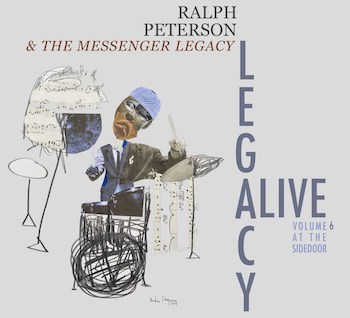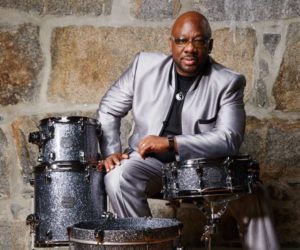Jazz CD Review: Ralph Peterson and the Messenger Legacy — Hard Bop, Revived
By Michael Ullman
Once again, drummer Ralph Peterson pays fine homage to Art Blakey’s tradition of joyous, hard-edged bashing jazz.
Ralph Peterson & The Messenger Legacy/ Legacy Alive: Volume 6 at the Side Door (Onyx).

“The Messenger” of this disc’s title is, of course, a reference to Art Blakey’s famous hard bop band The Jazz Messengers, which started in the late ’40s as a big band — it made one recording — and which later became one of the defining small bands in modern jazz. Perhaps it had best be considered a series of small bands. Blakey was celebrated for nurturing young musicians (Clifford Brown, Bobby Timmons, Lee Morgan, Wayne Shorter, and many others). The approach was that, like fledgling birds, they would be nudged out of the nest to fly when the time was right. “When these guys get too old,” Blakey famously said about his band with Clifford Brown, “I’ll get some young ones.”
Five of the once young ones are featured on this two-disc set, another of a series of Blakey tributes led by drummer Ralph Peterson. Peterson’s Blakey credentials are impeccable. He was once chosen to be Blakey’s other drummer in a short-lived, two drummer big band that some of us heard in 1983 at the Boston Globe Jazz Festival. Blakey, of course, didn’t need a back up. He was the powerhouse behind the famed Billy Eckstine big band in the ’40s. Nor was he, with his press rolls and violent crescendos, particularly subtle. He was, as conga player Ray Mantilla once told me, a “bashing kind of drummer.” Wayne Shorter, who joined Blakey in 1959 talked of “the bish-bash, sock’em dead routine we had with Blakey, with every solo a climax.”

Drummer Ralph Peterson. Photo: courtesy of the artist.
It’s Blakey’s tradition of joyous, hard-edged bashing jazz Peterson pays tribute to here, as well as on previous discs, such as his I Remember Bu (Onyx). On the eleven numbers in Legacy Alive: Volume 6, he is joined by Brian Lynch on trumpet, Bobby Watson and Bill Pierce on alto, Geoffrey Keezer, piano, and Essiet Essiet, who takes the thumping, rapid fire bass solo on “Blues March.” Peterson takes this famous Benny Golson number at a brisk trot rather than the stately walk of Blakey’s original. The other Golson composition, the sprightly “Along Came Betty,” is almost as well known. Its first soloist, Bobby Watson, starts with a series of jauntily smeared notes. He is followed by Lynch and Keezer, who take the piece into brassy territory before breaking out and re-quoting a fragment of the Golson melody.
To my ears, one of the most dramatically appealing pieces on the collection is Pierce’s feature, the ballad “My One and Only Love.” It’s been recorded hundreds of times, including by Ben Webster (with and also without Art Tatum) and repeatedly by John Coltrane. Pierce isn’t intimidated. He begins unaccompanied, leaving the listener in suspense until he plays the melody in his big-toned, forthright style. Of course, Peterson is heard everywhere, providing an intriguing hint of a shuffle beat behind Geoff Keezer on “Three Blind Mice,” deftly shifting rhythms on Wayne Shorter’s intriguing “Children of the Night,” which Blakey recorded in 1961 on Mosaic (Blue Note). He even becomes dainty (temporarily) behind Keezer’s statement of the theme of “That Ole Feeling.”
Like Blakey himself, this band delivers what Wayne Shorter called “the show-stopping stuff.” Given the directness of its robust musicality and hard-hitting skills, the Messenger Legacy band delivers the kind of ‘bish-bash’ that exhilarates.
Michael Ullman studied classical clarinet and was educated at Harvard, the University of Chicago, and the U. of Michigan, from which he received a PhD in English. The author or co-author of two books on jazz, he has written on jazz and classical music for The Atlantic Monthly, The New Republic, High Fidelity, Stereophile, The Boston Phoenix, The Boston Globe, and other venues. His articles on Dickens, Joyce, Kipling, and others have appeared in academic journals. For over 20 years, he has written a bi-monthly jazz column for Fanfare Magazine, for which he also reviews classical music. At Tufts University, he teaches mostly modernist writers in the English Department and jazz and blues history in the Music Department. He plays piano badly.
